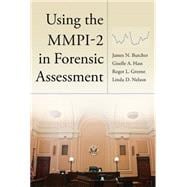The Minnesota Multiphasic Personality Inventory-2 (MMPI-2) is one of the most widely researched and used assessment tools in psychology. Forensic psychologists often rely on it to evaluate clients involved in civil and criminal cases. Because the test results can have a significant influence on court decisions, psychologists need to understand how to make full use of the MMPI-2 in forensic settings.
Building on his popular series of MMPI-2 books, James N. Butcher and his coauthors present this guide that is based on decades of research and personal experience. Following a brief overview of the MMPI-2 and its various scales, the authors further explore its applications in various forensic settings, including personal injury and workers’ compensation claims, immigration relief and deportation cases, and criminal investigations. Clear, practical guidelines bolstered by illustrative case examples will help psychologists:
- Understand legal and cultural factors that may influence the assessment process;
- Evaluate neuropsychological issues, such as brain injury;
- Employ computerized interpretations; and
- Present results in testimony and written reports








